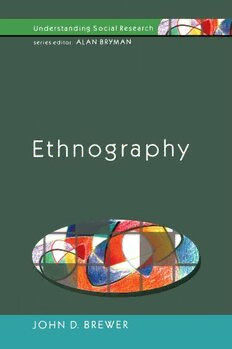
Ethnography PDF
224 Pages·2001·41.981 MB·English
Most books are stored in the elastic cloud where traffic is expensive. For this reason, we have a limit on daily download.
Preview Ethnography
Description:
What is ethnography in social research? To what use can ethnographic data be put? Who are its fiercest critics? Does ethnography have a future? Ethnography is one of the principal methods of qualitative research and has a long-established tradition of use in the social sciences. However, the literature on ethnography has become a battleground as ethnography is attacked from within and without the qualitative tradition. Post-modern critics attack the methodological status of ethnography and challenge the importance of its representations of reality, and others argue that globalization narrows its application as localism disappears. "Ethnography" provides a robust defence of this research method and establishes its continued relevance in the social sciences. It sets out the competing methodological bases of ethnography and details its different uses as a research method. The author offers guidelines for good practice in the research process, as well as advice on the analysis, interpretation and presentation of ethnographic data.; Although written as a textbook, the contents are research led, informed by the author's own extensive experience of undertaking ethnographic research in dangerous and sensitive locations in Northern Ireland and elsewhere. The result is a lively and engaging read on an essential topic for both students and researchers. Read more... Introduction -- The centrality of method in the social sciences -- What is 'method'? -- What is 'methodology'? -- Debate about methods in social sciences -- 1. What is ethnography? -- The history of ethnography -- Ethnography, sociology and common sense -- 'Big' and 'little' ethnography -- Critiques of ethnography -- 2. Ethnography as method amd methodology -- The philosophy of social research -- The natural science model of social research -- The humanistic model of social research -- The methodological bases of ethnography -- The double crisis of ethnography -- Post-postmodern ethnography -- 3. The research process in ethnography -- Research design in ethnography -- Data collection techniques -- Case studies and generalizations -- Other issues of good practice -- 4. The analysis, interpretation and presentation of ethonographic data -- Analysis -- Interpretation -- Reflexivity -- The presentation of ethnographic data -- 5. Uses of ethnography -- Knowledge generation -- Theory-building in ethnography -- Applied ethnographic research -- Conclusion: whither ethnography? -- Globalization and ethnography -- Tradition, identity and Ulster Loyalism -- The global-local nexus -- Local crime management in Belfast
See more
The list of books you might like
Most books are stored in the elastic cloud where traffic is expensive. For this reason, we have a limit on daily download.
